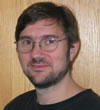|
|
 |

Worm
Could Cause
$50 Billion in Damages
|
|
|
|
 |
 |
|
|
| Paxson |
|
|
|
A
worst-case worm attack on the United States could easily
cost the country $50 billion in direct damages, a pair
of security experts said last week. Nicholas Weaver
and Vern Paxson, two security researchers who
work with the International Computer Science Institute
(ICSI), a nonprofit research group associated with UC
Berkeley, modeled a worst-case scenario in which state-sponsored
attackers construct a worm exploiting an unpublished
vulnerability, then launch it over the internet. Paxson
is also a staff scientist at Berkeley Lab. Full
story.

Cutting
The Cost
Of Energy Use
If
you feel that you're paying more for energy, you are.
Today, according to the Alliance to Save Energy, the
average American household spends about $1,400 each
year on energy bills. But cutting back on energy use
is not just a matter of turning devices off. Idle electronics
— such as the computer printer that isn't "on,"
but is plugged in — use energy to keep the display
lit. Those devices cost Americans more than $3 billion
annually, and use up about 5 percent of our domestic
energy, according to Berkeley Lab. Full
story.

|
 |
| |
 |
ASD
Writing Course
This Thursday
The
ASD Academy is offering a FranklinCovey Writing Advantage
course on Thursday, from 8 a.m. to 5 p.m. in Building
2-100B. The class provides students with tools to improve
written communication. Go here
to register (course #ASD0214). For more information,
contact Sue Bowen

|
 |
|

|
| |
 |
Climate
Change Confab
Features Lab Speakers
A
conference in Sacramento this Wednesday and Thursday
will focus on “Reducing Impacts Of Catastrophic
Climate Change in California.” Among the featured
speakers are Berkeley Lab scientists Lynn Price
and Alan Sanstad (Environmental Energy Technologies)
and Norm Miller (Earth Sciences). The conference
will explore documented reports of warmer temperatures,
declining spring snowpack, and earlier snowmelt in California,
which have raised concerns about the state's ability
to satisfy future water demands and generate sufficient
low-cost electricity from its hydroelectric power plants
to meet ever-increasing summer demand. Go here
for more information.
Oncology Technologies
Featured at BIO 2004
Pam
Siedenman, with the Lab’s Technology Transfer
Department, will be presenting a talk on six oncology
technologies that were developed here at the BIO 2004
conference in San Francisco this week. They include:
DNA-PKcs Phosphorylation Sites and Antibodies for Cancer
Research; Breast Cancer Therapy and Potential Method
for Enhancing Radiation Sensitivity via Inhibition of
ß1 Integrin; Identification of a Common Binding
Site on Tubulin for Paclitaxel, Epothilone, and Eleutherobin;
Gene Therapy Target and Marker for Invasive Human Breast
Cancer; Quantum Dot Based Cell Motility, Invasion, and
Metastasis Assays; and Biomarker for Cell Senescence.
Details on these technologies are available here.
|
 |
|

